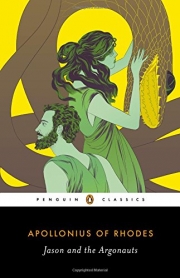Traci O’Dea

by Aaron Poochigian
Penguin
2014
$15.00
Aaron Poochigian’s new translation of Apollonius of Rhodes’ Jason & the Argonauts demands to be read aloud—lines of perfect, unforced iambic pentameter make it as lyrical as Shelley or Frost. When reading the text, I kept pausing to recite the verse, repeatedly, with different points of emphasis, in an attempt to do justice to the euphony of Poochigian’s English translation. So many of the lines drip from the tongue:
She dropped her gaze, but as she did
a smile as sweet as nectar spread across her face.
Her heart had flamed beneath his flattery. (III.1305-7)
Over and over flood tides leave the mainland
and then come rushing back to drag salt water
across the sand. One of these tides abruptly
dropped the Argo so far up the beach
that little of the keel was still in water. (IV. 1592-6)
To complement the lulling meter of the second quote, Poochigian deftly incorporates enjambment to duplicate the action of the poem with “and then come rushing back to drag salt water/ across the sand” and “One of these tides abruptly/ dropped…” The enjambment works on the page, out loud, and in the reader’s psyche, dragging her across the sand before abruptly dropping her on the beach.
The English words slip from the reader’s lips, and Poochigian uses his command of English verse to musicalize the Greek. The meter further assists in proper pronunciation of Greek names and places. (Argonauts’ names appear in bold in the text).
Cometes’ son Asterion arrived
without delay. He hailed from Peiresiae… (I.51-2)
Since he was Jason’s uncle, Iphiclus
did not remain at leisure in Phylaca. (I.64-5)
Next came those wardens of Oechalia… (I.124)
This section introducing the Argonauts could have sounded flat, like a registry, akin to I Chronicles in the Bible. Thanks to Apollonius and Poochigian, it reads more like Milton’s description of Satan’s fallen angels in Paradise Lost.
Along with the sparkling language, the tale itself is enthralling, an adventure brimming with Grecian lustiness, the fickle sea, murder, monsters, and those peeving gods. The Argonauts’ first disembarkation sets the tone for the rest of the tale. It takes them to the isle of Lemnos where Hypsipyle and the other women have committed androcide, killing all the males.
Stricken with an insatiable resentment
that would destroy their way of life, the women
cut down not only their own wedded husbands
and all the battle brides who slept with them
but every other male as well, the whole
race of them, so that no one would survive
to make them pay for their atrocious slaughter. (I.820-36)
When Jason and his shipmates come ashore, the women of Lemnos tell a truth-infested lie to the Argonauts about their men, saying they had indeed shacked up with Thracian girls but that the women of Lemnos had given them an ultimatum to “change their ways or pack up/ their concubines and settle somewhere else” (I.1102-3). Hypsipyle fibs that the men replied by taking all the boy children with them and leaving to start new lives, “on the snowy plains of Thrace,/ where they are living still” (I.1107). This section also establishes how Jason, like Odysseus, is easily swayed by ego-stroking and sex. He would have lingered on Lemnos with Hypsipyle if not for Heracles’ reproaches to the other Argonauts that they resume the quest they’d set themselves: to gain the Golden Fleece.
After more adventures and the departure of Heracles, the second half of the book sees the introduction of Medea who, once pierced with “cackling” Eros’ arrow, becomes infected with a disruptive and consuming love for Jason. Medea is corrupted by love to the point that it makes her eschew her principles, self-respect, and common sense in order to serve the object of her affection. Appollonius, through Poochigian, writes of Medea’s love torture with a depth and insight that make her trials more vivid than those of Jason and the other questers on the Argo, so her internal struggles resonate more than the Argonauts’ swashbuckling episodes. For this reason, the book stands out over many other adventure epics because it does not merely recount the physical tale but gives readers a glimpse into how the ancient Greeks perceived the agony of love—which turns out to be not much different from how it’s often perceived today.
Traci O’Dea lives in the Virgin Islands and has been an associate editor of Smartish Pace since 2003.

